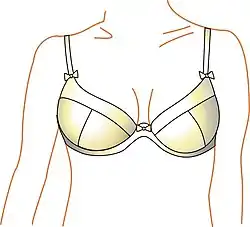bra
Translingual
English

Pronunciation
- enPR: brä, IPA(key): /bɹɑː/
- (Ireland): IPA(key): /bɹæ/
Audio (AU) (file) - Rhymes: -ɑː
Etymology 1
Clipping of brassiere, borrowed from French brassière, from Old French braciere (originally a lining inside armor to protect the arm, but later a garment), from Old French brace (“arm”), from Latin bracchia, plural of Latin bracchium (“forearm”), from Ancient Greek βραχίων (brakhíōn, “forearm”), from Proto-Hellenic *brəkʰús (“short”) (because the forearm is shorter than the upper arm), inherited from Proto-Indo-European *mréǵʰus.
Noun
bra (plural bras)
Derived terms
- balconette bra
- balcony bra
- bra burner
- bra chain
- bra insert
- bra-burning
- bra-ket
- bullet bra
- cantilever bra
- car bra
- cold as a witch's tit in a brass bra
- jog bra
- jogging bra
- long-line bra
- maternity bra
- nursing bra
- peek-a-boo bra
- peekaboo bra
- plunge bra
- pocket bra
- push-up bra
- shelf bra
- sports bra
- T-shirt bra
- training bra
- underwired bra
Translations
|
Etymology 2
From bracket, referring to the notation introduced in 1939 by Paul Dirac.
Noun
bra (plural bras)
- (physics) One of the two vectors in the standard notation for describing quantum states in quantum mechanics, the row vector; the other (column) vector being its complex conjugate, the ket.
Antonyms
Related terms
- bra-ket
- ket-bra
Noun
bra (plural bras)
Afrikaans
Pronunciation
- IPA(key): /brɑː/
Cebuano
Pronunciation
- Hyphenation: bra
Quotations
For quotations using this term, see Citations:bra.
Garo
Etymology
(This etymology is missing or incomplete. Please add to it, or discuss it at the Etymology scriptorium.)
Khotanese
Norman
Etymology
From Old French bras, from Vulgar Latin *bracium, from Classical Latin bracchium, from Ancient Greek βραχίων (brakhíōn).
Norwegian Bokmål
Pronunciation
- IPA(key): /bɾɑː/
Adjective
bra (indeclinable, comparative bedre, indefinite superlative best, definite superlative beste)
Derived terms
References
- “bra” in The Bokmål Dictionary.
Norwegian Nynorsk
Adjective
bra (indeclinable, comparative betre, indefinite superlative best, definite superlative beste)
Derived terms
References
- “bra” in The Nynorsk Dictionary.
Scots
Etymology 1
Borrowed from braf (“good, brave”); from Low German brav; from French brave, borrowed from Italian bravo.
See also
Swedish
Etymology
Since at least 1621, from braf (“good, brave”); from Low German brav; from French brave, borrowed from Italian bravo.
Pronunciation
audio (file) - IPA(key): /brɑː/, /brɒː/
Usage notes
In informal (often jocular or childish) contexts, bäst may be inflected further and given the comparative bästare (bester) and the superlative bästast, bästaste (bestest); these forms are also nonstandard.
Declension
| Inflection of bra | |||
|---|---|---|---|
| Indefinite | Positive | Comparative | Superlative2 |
| Common singular | bra | bättre | bäst |
| Neuter singular | bra | bättre | bäst |
| Plural | bra | bättre | bäst |
| Masculine plural3 | bra | bättre | bäst |
| Definite | Positive | Comparative | Superlative |
| Masculine singular1 | bra | bättre | bäste |
| All | bra | bättre | bästa |
| 1) Only used, optionally, to refer to things whose natural gender is masculine. 2) The indefinite superlative forms are only used in the predicative. 3) Dated or archaic | |||
Further reading
- bra in Svensk ordbok.
Tagalog
Pronunciation
- IPA(key): /ˈbɾa/, [ˈbɾa]
Derived terms
- magbra
- pagbabra
See also
Yola
Alternative forms
Etymology
From Middle French brave, borrowed from Italian bravo, itself of uncertain origin.
References
- Jacob Poole (1867), William Barnes, editor, A Glossary, With some Pieces of Verse, of the old Dialect of the English Colony in the Baronies of Forth and Bargy, County of Wexford, Ireland, London: J. Russell Smith, page 27